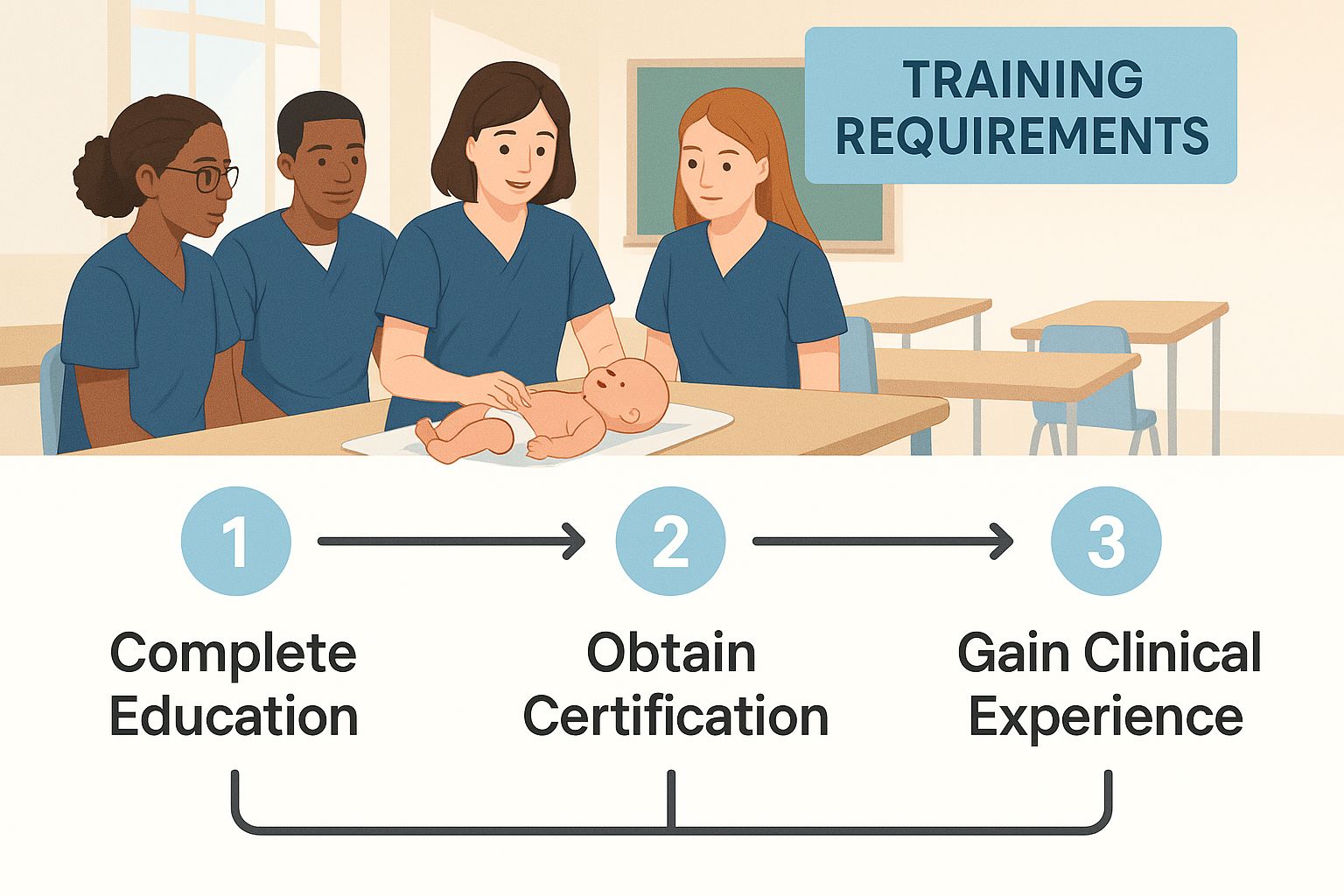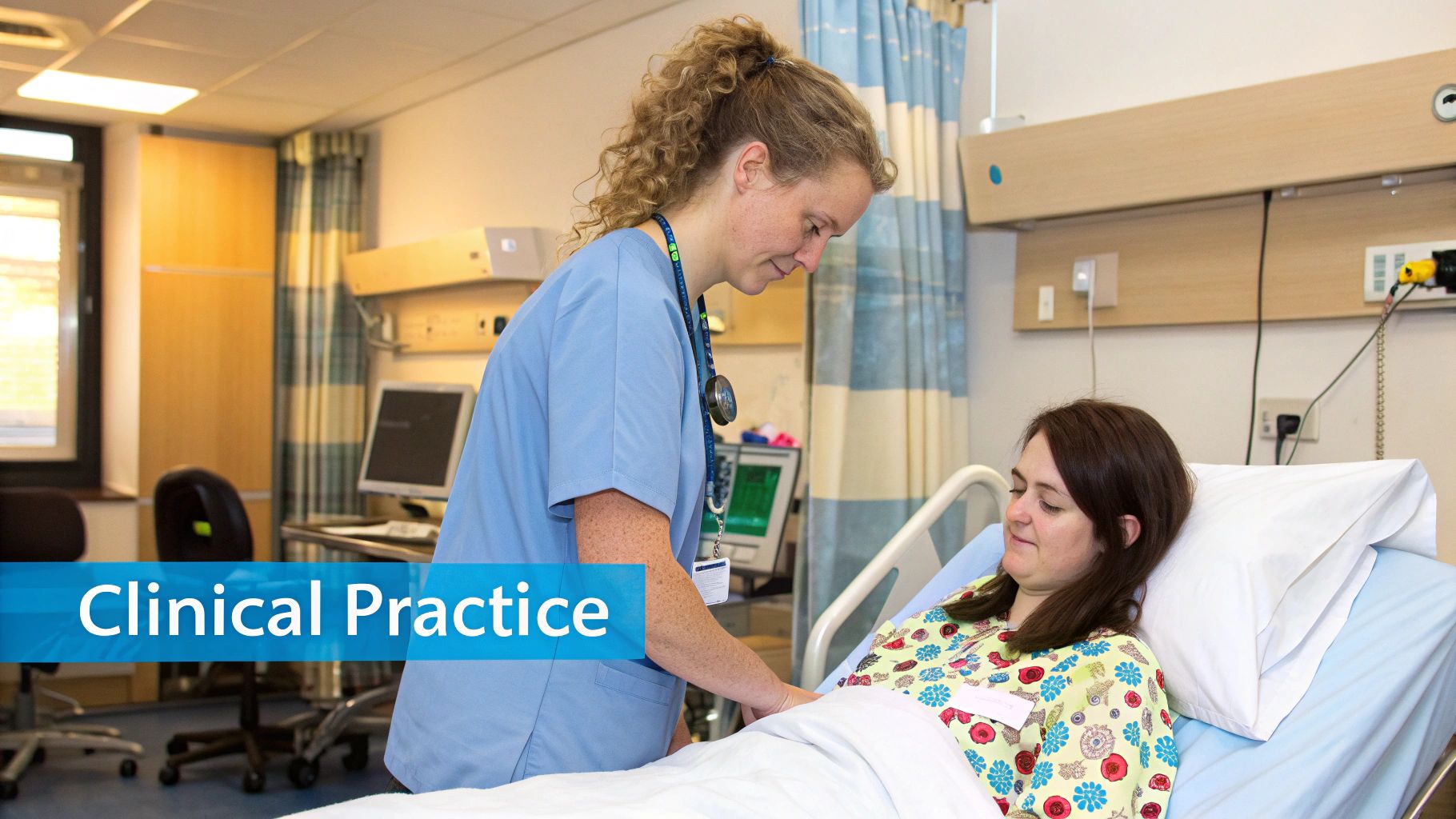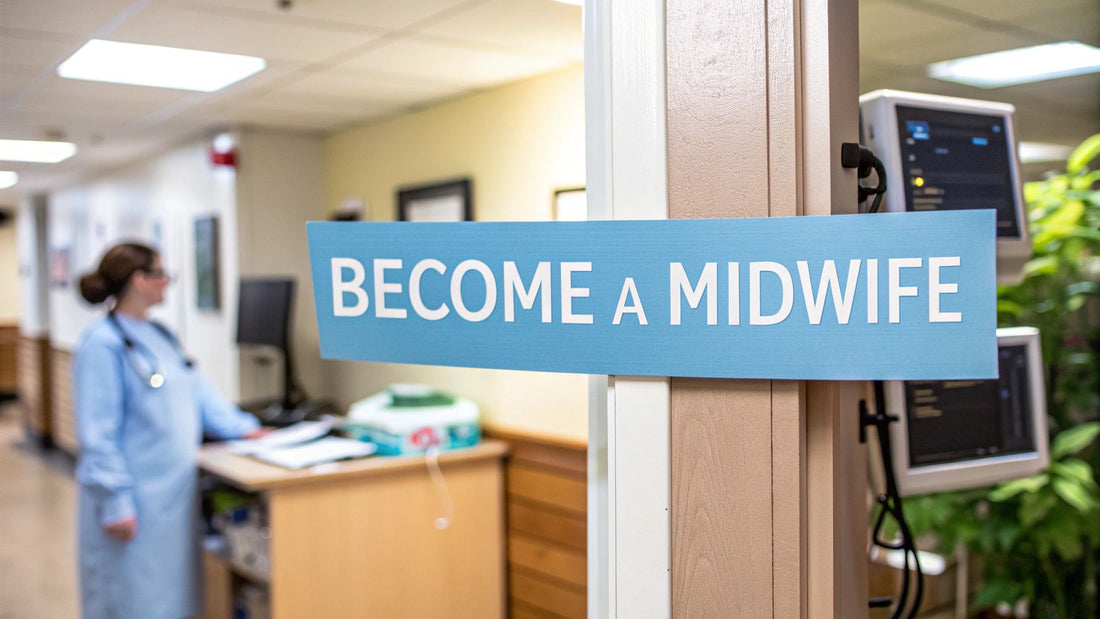Deciding to become a midwife is so much more than a career choice. It's a deep, personal commitment to stand alongside families during one of the most powerful moments of their lives. The path isn't easy—it involves earning a place at university, navigating a demanding degree, and finally registering as a qualified professional. This guide is here to walk you through every single step of that journey in the UK.
Is a Career in Midwifery Right for You?
Before you even think about applications, the first and most important step is to ask yourself a tough question: is this really the path for me? It's a role that requires a very specific blend of scientific understanding, hands-on skill, and a huge amount of compassion.
The job goes far beyond just delivering babies. It's about providing continuous, holistic care, education, and support to individuals and their families from the first weeks of pregnancy right through the postnatal period.
Being a midwife is incredibly rewarding. You get the privilege of witnessing moments of pure joy and profound human connection. But it's also a role that demands immense emotional resilience. You'll be there to support families through difficult, sometimes devastating, outcomes. You’ll need to navigate high-pressure clinical situations and work long, unsociable hours. The physical and emotional toll can be significant, so having a strong personal support system is absolutely vital.
Understanding the Core Qualities of a Midwife
Succeeding in this field is about more than just good grades. Universities and employers are looking for specific personal qualities that show you're cut out for the realities of the job. Before you dive into the application process, take a moment for some honest self-reflection. Do these traits sound like you?
- Empathy and Compassion: Can you genuinely connect with people from all walks of life and offer non-judgmental support when they are at their most vulnerable?
- Resilience and Calmness Under Pressure: Birth is unpredictable. You have to be able to think on your feet and act decisively, especially in an emergency.
- Strong Communication Skills: A huge part of the job is explaining complex information clearly, advocating for your patients' wishes, and working closely with a wider healthcare team.
- A Commitment to Advocacy: Midwives are champions for informed choice. You'll be responsible for making sure the people in your care are at the very centre of every decision made.
A cornerstone of modern midwifery is patient-centred care—treating every single person with respect and dignity. This means actively removing barriers to care and showing up for patients with kindness, no matter their circumstances.
Thinking deeply about whether these qualities resonate with you is a crucial first step. If you're still exploring your options and want to make sure your future career truly aligns with your personal values, our guide on how to find the career that's right for you offers some really helpful insights.
Meeting the Entry Requirements for a Midwifery Degree
Getting a place on a midwifery degree course is notoriously competitive. Universities aren't just looking for top grades; they're searching for a unique blend of academic ability and the right personal qualities. Your journey really starts here, by building a strong foundation in both areas.
First things first, let's talk academics. Most universities have a clear checklist of what you'll need. You will almost certainly need GCSEs at grade C/4 or above in Maths, English Language, and a science subject (like Biology or Human Biology). Think of these as the non-negotiables – they prove you have the core numeracy, literacy, and scientific understanding to even begin the course.
Once you've got those ticked off, you'll need Level 3 qualifications. For many people, that means A-Levels.
Choosing Your A-Levels or Equivalent
If you're going down the A-Level route, a subject like Biology is a fantastic choice as it links directly to so much of the degree content. Other subjects like Psychology, Sociology, or Health and Social Care are also looked on very favourably. Admissions tutors see these as a sign that you understand the wider, human context of providing care.
But A-Levels are far from the only way in. Many aspiring midwives, especially those returning to education, find that an Access to Higher Education Diploma (Midwifery) is the perfect alternative. These courses are tailor-made to get you ready for the demands of university study and are accepted across the UK. To get a better feel for this pathway, you can check out our detailed guide on the midwifery access course.
There are a few well-trodden paths to securing a place on a midwifery degree. This table breaks down the most common routes.
Common Pathways to a Midwifery Degree
| Pathway | Typical Qualifications | Key Considerations |
|---|---|---|
| A-Levels | 3 A-Levels, often including at least one science subject like Biology. | The traditional route for school leavers. Subject choice is important. |
| Access to HE Diploma | An Access to HE Diploma in Midwifery or a related subject (e.g., Nursing). | Ideal for mature students or those without traditional qualifications. Highly focused on preparing you for a healthcare degree. |
| BTEC Level 3 | An Extended Diploma in a relevant subject like Health and Social Care. | Check with individual universities, as some may have specific unit or grade requirements. |
| Foundation Year | An integrated foundation year as part of a 4-year degree programme. | A good option if you don't meet the direct entry requirements but show potential. |
No matter which academic path you choose, remember that it's just one piece of the puzzle. What you do outside the classroom is just as important.
The infographic below gives a great overview of the training you'll undertake once you're on the course.

As you can see, the journey is a real mix of academic learning and essential, hands-on clinical experience.
Gaining Relevant Hands-On Experience
While good grades will get your application through the initial sift, it's your experience and personal qualities that will truly make it shine. Admissions tutors need to see proof that you understand what working in healthcare is really like.
Getting that experience doesn't have to be complicated. Here are a few ideas:
- Volunteering: Roles in hospitals, local care homes, or with charities like the NCT can offer incredible insight.
- Paid Work: Landing a job as a Maternity Support Worker (MSW) or a Healthcare Assistant (HCA) is one of the best ways to get direct experience on a maternity ward.
This kind of background shows you're committed. It gives you a chance to develop core skills like communication, empathy, and teamwork, and it provides you with real-world stories to talk about in your personal statement and interviews.
Financial and Personal Commitment
It’s also really important to be realistic about the commitment involved. Securing a place on a degree course is just the beginning. The financial side is a huge factor for many, with some midwifery students in England graduating with debts over £40,000. While the NHS does offer a training grant of up to £5,000 per year to help out, this financial pressure is a serious challenge. You can read more about this on the RCM website.
Key Takeaway: A strong application is a two-part story. It's about your academic achievements and your proven passion for the profession. Both need to be compelling to give you the best shot at securing a place.
Ultimately, universities are looking for compassionate, resilient, and dedicated people. By meeting the academic requirements and backing them up with meaningful experience, you show them you have what it takes to succeed—not just on the course, but as a future midwife.
What to Expect from Your Midwifery Training
Getting into a midwifery degree is one thing, but the training itself? It's an intense, all-in experience that will push you academically, emotionally, and physically. The whole course is built to give you a solid theoretical grounding while throwing you straight into the practical, hands-on skills you’ll need from day one on the job.
Most midwifery degrees are split roughly 50/50 between learning at university and getting real-world experience on clinical placements. This means a typical week could see you in lectures for two days, then pulling on your scrubs for three shifts on a busy labour ward. It’s a full-on schedule that demands brilliant time management and a genuine love for what you’re learning.
The Academic Foundation of Your Degree
Your time at university is where you’ll build the scientific and theoretical backbone of your practice. It’s not just about learning how to do something; it’s about understanding the complex why behind every single clinical decision you’ll ever make.
Core modules often cover areas like:
- Anatomy and Physiology: Getting to grips with the human body, specifically how it changes during pregnancy, birth, and the postnatal period.
- Pharmacology: Learning all about the medications used in maternity care, their effects, and how to administer them safely.
- Public Health and Sociology: Looking at the bigger picture and exploring how social factors can impact the health of mothers and babies.
- Professional and Ethical Studies: Understanding the legal frameworks and tricky ethical dilemmas that are part of everyday midwifery.
But it's not all about burying your head in textbooks. You'll spend plenty of time in skills labs, practising procedures like taking blood pressure or performing neonatal resuscitation on realistic mannequins in a safe, controlled environment long before you do it for real.
You’ll learn to critically appraise research, write reflective essays on your clinical experiences, and prepare presentations. These academic skills are just as vital as your clinical abilities, as they underpin the evidence-based care you'll provide throughout your career.
Assignments are deliberately varied to test different skills. One month you might be writing a detailed case study on a complex birth you witnessed on placement, and the next you could be sitting an exam on fetal monitoring.
Thriving in Clinical Placements
This is where the theory you've been learning smacks right into reality. Your clinical placements are your chance to work alongside experienced midwives and other healthcare professionals, providing direct care to women, birthing people, and their families.
You'll rotate through different settings to make sure you get a properly rounded experience. Each one gives you a unique window into the journey of pregnancy and birth.
- Labour Ward: A high-pressure, fast-paced environment where you'll support people through labour and birth, learning to handle emergencies as they happen.
- Community Midwifery: You'll be out and about with a team, visiting people at home or in local clinics for antenatal check-ups and postnatal care.
- Antenatal and Postnatal Wards: This is where you'll care for people before and after birth, helping with everything from infant feeding to recovery and early parenting worries.
- Neonatal Units: You may get the chance to spend time caring for babies who need a bit of extra medical support after they're born.
Every placement has a practice assessment document where your mentor—an experienced midwife—will sign off on your skills as you achieve them. Building a strong, respectful relationship with your mentors is absolutely vital. They are your teachers, your guides, and your support system on the front line.
Building Your Support System
Don’t underestimate the emotional and physical toll of learning to be a midwife. You will witness the most incredible moments of pure joy, but you will also face tough, challenging, and sometimes heartbreaking situations. Creating a solid support network isn't just a nice idea; it's essential for your own wellbeing and your success on the course.
Lean on your university friends. They are the only other people who truly get what you're going through. Share your stories, celebrate the wins, and prop each other up on the difficult days. Your tutors are also there to provide academic and pastoral support, so don't ever be afraid to reach out if you're finding things tough.
For a real-world perspective on what it's like to balance these demands, our sample lesson with a registered midwife offers fantastic insights into the student experience.
Becoming a Newly Qualified Midwife

Graduating with your midwifery degree is a massive achievement, but it’s really just the beginning. The first thing on your to-do list, and it's non-negotiable, is getting registered with the Nursing and Midwifery Council (NMC). Think of it as your official licence to practise midwifery anywhere in the UK.
Don't worry, your university will walk you through the whole process towards the end of your studies. You’ll need to make a declaration of good health and character, and once it's all approved, you'll be given your unique NMC PIN. This number is yours for your entire career and proves you’re a registered professional.
Navigating the Job Market
Once that PIN is in your hands, the real fun begins: the job hunt. It can be a strange and sometimes frustrating experience for newly qualified midwives. We all know there's a national shortage, yet things like recruitment freezes and NHS funding issues can make finding that first job surprisingly competitive.
It’s a tough reality. A recent report from the Royal College of Midwives about the challenges new midwives face highlighted that more than eight out of ten students feel unsure about getting a job after they qualify. On top of that, 75% of those finishing their degrees were hitting major roadblocks, even when they were actively applying for roles.
This is exactly why your application needs to shine. Your CV and personal statement have to do more than just list what you’ve done – they need to tell your story.
- Customise your CV: Never send out a generic application. Get forensic with the job description and make sure you’re highlighting the exact skills and experiences they’re asking for.
- Bring your placements to life: Don’t just list where you were. Give them real-world examples. What did you learn on the labour ward? How did you manage a complex situation in the community? Show, don't just tell.
- Use numbers: Have you been involved in a certain number of births? Got signed off on specific skills? Put those figures in! It gives tangible proof of what you're capable of.
When you do land an interview, be ready to dive deep into your placement experiences. A great way to structure your answers is by using the STAR method (Situation, Task, Action, Result). It helps you give clear, confident examples that really showcase your practice.
Understanding Your Preceptorship Year
Your first year on the job is called a preceptorship. It’s a structured programme designed to help you transition from being a student to a confident, autonomous midwife. It's not about starting from scratch; it's about putting everything you’ve learned into practice within a supportive environment.
Your preceptorship is a bridge between being a student and becoming an experienced professional. It gives you the space to consolidate your skills, build confidence, and grow into your role with the safety net of experienced colleagues around you.
During this year, you'll be matched with a preceptor – an experienced midwife who will be your mentor. They're there to offer guidance, answer your questions, and give you constructive feedback. You'll have regular catch-ups to talk about your progress, set new goals, and work through anything you’re finding challenging.
This year is absolutely vital for building your clinical confidence and sharpening your decision-making skills. It’s an acknowledgement that becoming a brilliant midwife is a journey, and the learning definitely doesn’t stop the moment you toss your graduation cap in the air.
Building Your Midwifery Career Path

Qualifying as a midwife is a huge achievement, but it's really the starting line of a lifelong career, not the finish. The professional landscape is always shifting, shaped by everything from new models of care to workforce trends.
As of March 2025, there were 46,606 midwives on the NMC register – a 5.6% jump from the previous year. Dig a little deeper, though, and you'll see a 12.5% drop in UK-educated midwives joining. This highlights the ongoing challenge of meeting demand and why adaptable, skilled midwives are so needed. If you’re interested in the numbers, you can explore the latest NMC registration figures on Mentor Merlin's blog.
Understanding this context is key as you start to map out your own long-term goals beyond that initial preceptorship year. Your degree gives you the foundation, but the real excitement comes when you start to specialise.
Finding Your Niche in Midwifery
Once you’ve found your feet and consolidated your core skills, the real fun begins. Midwifery is a vast field with so many different pathways you can take, and now you can start exploring roles that truly align with your passions.
Think back to your placements – what really sparked your interest?
- Complex Care: Did you feel most at home on the antenatal ward, supporting women with conditions like diabetes or hypertension? A specialist role here involves much deeper, more continuous case management.
- Perinatal Mental Health: Maybe you found a real connection supporting the emotional wellbeing of new parents. Specialist perinatal mental health midwives play a vital part in providing this targeted, compassionate support.
- Public Health: If you’re passionate about tackling health inequalities, a role focusing on public health, infant feeding support, or smoking cessation could be a perfect fit.
Your career is a living thing; it will evolve as you gain experience and discover what truly motivates you. Don't be afraid to change direction or pursue a new specialism that sparks your interest years down the line.
Advancing into Leadership and Beyond
For some, the long-term goal is to influence care on a much broader scale. Midwifery offers clear routes into leadership, research, and education if that’s where your ambitions lie. You might aspire to become a Consultant Midwife, a role at the absolute pinnacle of clinical practice, driving innovation and leading service-wide improvements.
Alternatively, you could move into a management role as a Matron or Head of Midwifery, shaping the strategic direction of an entire maternity service.
If you love the academic side of things, a career as a university lecturer or a clinical researcher lets you train the next generation of midwives and contribute to the evidence that underpins our practice. The possibilities really are endless.
Got Questions About Becoming a Midwife? We’ve Got Answers
Deciding to become a midwife is a huge step, and it’s completely natural to have a long list of questions. Getting clear, honest answers is the best way to plan your journey with confidence.
Let’s tackle some of the most common queries we hear from aspiring midwives.
Can I Become a Midwife Without a Degree?
The short answer is no. To practise as a midwife in the UK, you absolutely must have a degree in midwifery that’s been approved by the Nursing and Midwifery Council (NMC). This isn't just a university rule; it's a legal requirement to ensure every midwife is trained to the same high standards.
But don’t let that discourage you if you don't have the qualifications to apply right now. A brilliant way to get your foot in the door is by working as a Maternity Support Worker (MSW) or a Healthcare Assistant (HCA). This kind of hands-on experience is invaluable and will make your future university application stand out.
How Long Does It Take to Train as a Midwife?
This really depends on your starting point. For most people taking the standard route, a full-time undergraduate midwifery degree takes three years to complete.
However, if you're already a registered adult nurse, there's a much faster path. You can apply for a shortened 'conversion' course, which is typically just 18 months long. This route recognises your existing clinical skills and knowledge, allowing you to build on your nursing foundation to qualify as a midwife more quickly.
It's a big commitment, no matter which path you take. Both the three-year and 18-month courses are intense, but they are designed to fully equip you for the realities and responsibilities of the job, leading to the same professional registration with the NMC.
Is There an Age Limit for Midwife Training?
Absolutely not. There is no upper age limit for starting your midwifery training in the UK. In fact, universities love welcoming mature students. You bring a wealth of life experience, resilience, and a grounded perspective that is incredibly valuable in midwifery.
Admissions tutors are far more interested in your passion, your understanding of what the role truly involves, and your ability to cope with the academic and emotional demands. If you meet the entry criteria and can show your commitment, your age is an asset, not a barrier.
What Is a Typical Midwife Salary in the UK?
Once you qualify, you'll start as a newly qualified midwife in the NHS at Band 5 on the Agenda for Change pay scale. After your initial preceptorship year, it's very common to move up to a Band 6 position, which comes with a salary increase and more responsibility.
From there, you can progress into senior, specialist, or leadership roles at Band 7 and beyond. It’s also worth remembering that your salary can be higher in certain areas, like London, where there are cost-of-living supplements.
Are you ready to take the first step towards your dream career but don't have the traditional qualifications? At Access Courses Online, we specialise in helping learners like you get university-ready. Explore our accredited online Access to HE Diploma in Midwifery and start your journey today.

